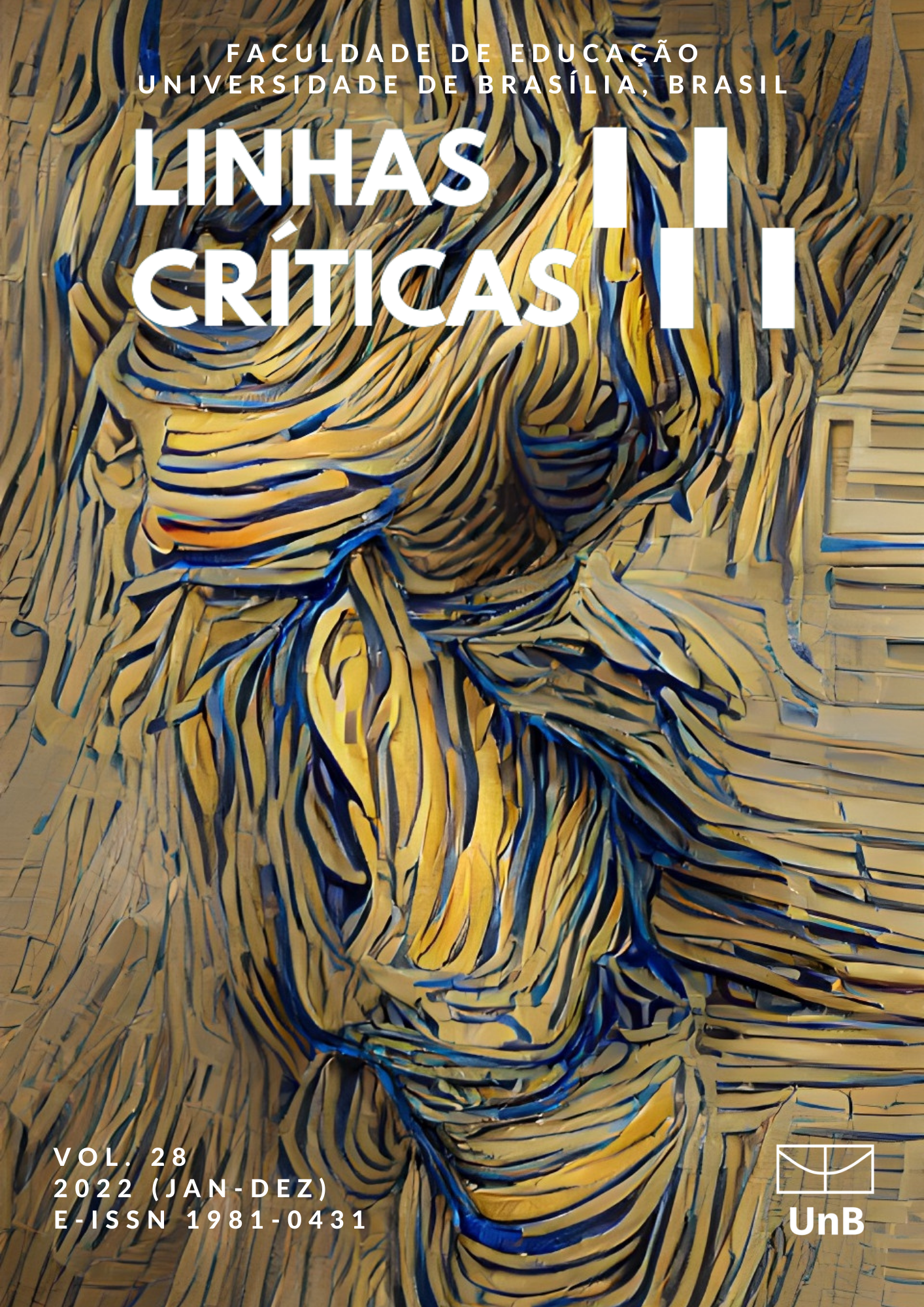Child-centered school: is it still possible for students to identify with teachers?
DOI:
https://doi.org/10.26512/lc28202242949Keywords:
Psychoanalysis and Education, Subject of the unconscious, Transference, Symbolic transmission, IdentificationAbstract
The article problematizes the political emancipation of children. Having been conceived under the essentialist inspiration of psychology, it focused the school on The Child. The article is inserted in Psychoanalysis and Education and has as concepts: subject of the unconscious; transference; (dis)identification; and work via di porre. It is argued that the emancipation of students does not occur without transferential identification with teachers, positioning them in the place of the ego-ideal. It is concluded that thankful to this, students acquire symbolic traits that enrich their ego-Ideal, just as, grateful to the disidentification with the master, students subjectivize school knowledge.
Downloads
References
Arendt, H. (2005). Entre o passado e o futuro. Perspectiva.
Batista, D. E. (2012). O declínio da transmissão na educação: notas psicanalíticas. Annablume.
Batista, D. E. (2022). Vicissitudes da transmissão na escola: reflexões em psicanálise e educação. Educação em Foco, 27(1), e27015. https://periodicos.ufjf.br/index.php/edufoco/article/view/36126
Blais, M. C., Gauchet, M., & Ottavi, D. (2014). Transmettre, apprendre. Pluriel.
Bondía, J. L. (2002). Notas sobre a experiência e o saber de experiência. Revista Brasileira de Educação, 19, 20-28. https://doi.org/10.1590/S1413-24782002000100003
Corso, M., & Corso, D. L. (1997). Game over. Em A. Jerusalinsky. Adolescência entre o passado e o futuro (pp. 81-95). Artes e Ofícios.
Dufour, D. R. (2005). A arte de reduzir as cabeças: sobre a nova servidão na sociedade ultraliberal. Companhia de Freud.
Freud, S. (2010). Conferência 34. Esclarecimentos, explicações, orientações (1933). Em S. Freud. Obras completas (pp. 294-321). Companhia das Letras.
Freud, S. (2016). Psicoterapia (1905). Em S. Freud. Obras completas (pp. 331-347). Companhia das Letras.
Gallo, S., & Limongelli, R. M. (2021). “Infância maior”: linha de fuga ao governo democrático da infância. Educação e Pesquisa, 46, e236978. https://doi.org/10.1590/S1678-4634202046236978
Giuliano, F. (2020). Psicoanálisis y educación: acerca de lo imposible versus la razón evaluadora. Estudos Contemporâneos da Subjetividade, 10(1), 123-144. http://www.periodicoshumanas.uff.br/ecos/article/view/3028
Lajonquière, L. (1993). De Piaget a Freud: para repensar as aprendizagens: a (psico)pedagogia entre o conhecimento e o saber. Vozes.
Lajonquière, L. (1999). Infância e ilusão (psico)pedagógica: escritos de psicanálise e educação. Vozes.
Magritte, R. (1929). La trahison des images [Óleo sobre tela, 60 cm x 81 cm]. Lacma, Los Angeles Country Museum of Art. https://collections.lacma.org/node/239578
Mannoni, M. (1977). Educação impossível. Francisco Alves Editora.
Millot, C. (1992). Freud Antipedagogo. Zahar.
Voltolini, R. (2021). Infância com problemas. Editorial. Estilos da Clinica: revista sobre a infância com problemas, 26(3), 418-420. https://doi.org/10.11606/issn.1981-1624.v26i3p418-420
Published
How to Cite
Issue
Section
License
Copyright (c) 2022 Douglas Emiliano Batista

This work is licensed under a Creative Commons Attribution 4.0 International License.
Authors who publish in this journal agree to the following terms:
-Authors maintains the copyright and grants the journal the right of first publication, the work being simultaneously licensed under the Creative Commons Attribution License which allows the sharing of the work with recognition of the authorship of the work and initial publication in this journal.
- Authors are authorized to enter into additional contracts separately, for non-exclusive distribution of the version of the work published in this journal (eg publish in institutional repository or as a book chapter), with acknowledgment of authorship and initial publication in this journal.
-Authorers are allowed and encouraged to publish and distribute their work online (eg in institutional repositories or on their personal page) at any point before or during the editorial process, as this can generate productive changes as well as increase the impact and the citation of published work (See The Effect of Free Access).



